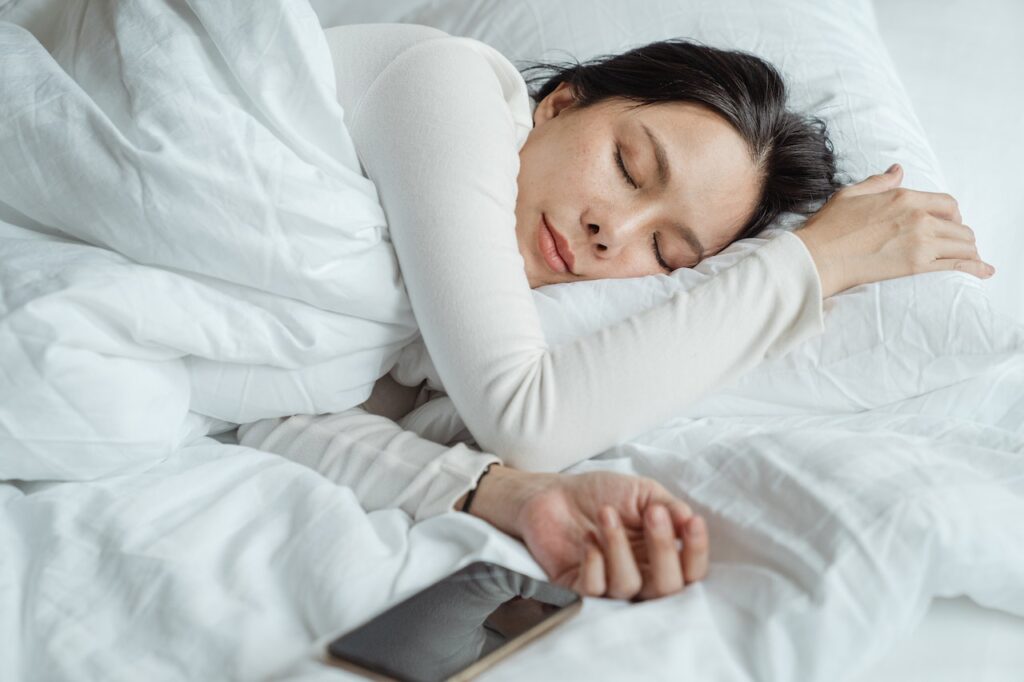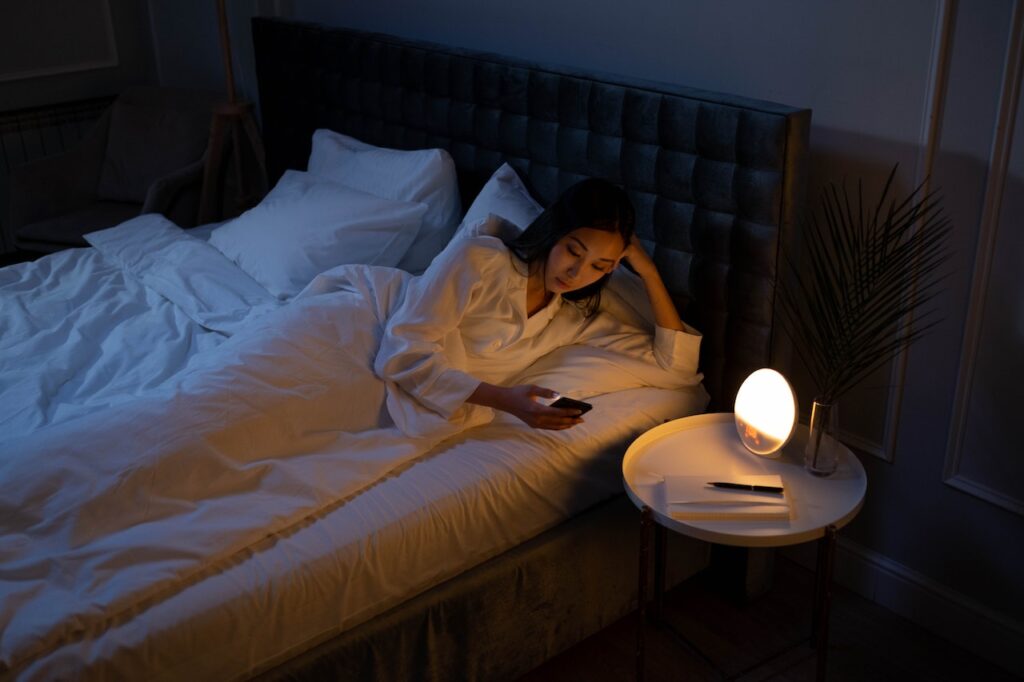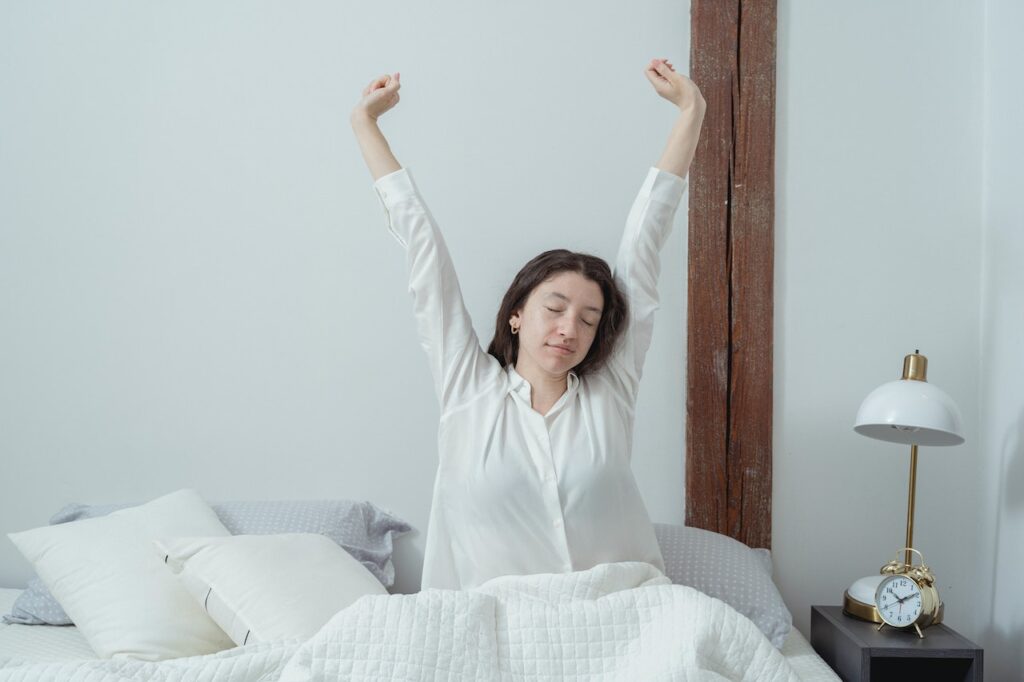Sleep plays such an important role in the way we function (regulation, recovery, and repair), how productive we are in the day, and keeps us in good health (it mitigates risks of chronic illness like coronary disease, diabetes, and dementia) and spirits. This pillar of health is not something to compromise on. One reason why you may struggle with sleep is you’re fighting your natural sleep-wake cycle.
Why our circadian rhythm matters
The body and brain run on a natural clock. This clock is what gives us our circadian rhythm (our daily sleep-wake cycle). The circadian rhythm determines the time of the day when we are most likely to feel alert and active, and when we are most likely to be active. It also determines the time we are likely to fall asleep.

Our circadian rhythm influences many of our biological functions including what time we’re likely to sleep. Photo by Ketut Subiyanto from Pexels.
This clock exists within every cell, although the master timekeeper is found in the brain, in an area known as the suprachiasmatic nucleus (SCN).
The natural clock runs slightly longer than 24 hours. This means that in the absence of cues such as light, mealtimes, and social activities, we are likely to run on a clock that gets slightly delayed with every passing day.
Are you a lark or an owl?
Genetics controls this rhythm in part. Some individuals have a rhythm (also known as chronotype) that makes them larks. This means that given a choice, they are likely to sleep early and wake early. Larks are the most alert and productive in the early part of the day.
Individuals with a late chronotype (or owls) would prefer to go to bed late and wake up much later than society deems normal.
It is possible to adjust this with the help of light exposure, activities (like exercise or work), and bedtime. This adjustment, also known as chronotherapy, needs a slow adjustment to a new “best time” for sleep and activity, and once adjusted, light, discipline, and routine are important for maintaining this rhythm.
Shift workers, typically those with a more haphazard schedule (not a fixed night shift or morning shift) may find it difficult to cope. This can result in insufficient sleep or disrupted unconsolidated sleep that can affect health over the long term. There are also daytime consequences such as loss of productivity, as well as the risk of accidents.

Light influences our circadian rhythm significantly and helps our cells “keep time”. Photo by Ron Lach from Pexels.
Let there be light
Light is the most important external zeitgeber or factor that influences our circadian rhythm. Light (especially light waves in the blue frequency) acts on cells in the retina of the eyes known as melanopsin cells. These melanopsin cells signal to the SCN which then relays this message of light signals to other cells in the body and this helps the cells to “keep time”.
Almost all our bodily functions including sleep, making hormones, and digestion runs on a rhythm determined by the interaction between our genes and our external environment.
Sleep cycles
Essentially, sleep and wake are alternating states of brain activity although the lines between these two states can sometimes be blurred either by disease, such as insomnia, sleepwalking, or sleep paralysis.
A night’s sleep is usually divided into sleep cycles which last about 90 minutes each. Therefore, most people will go through four to five cycles of sleep each night.
During a sleep cycle, the brain goes through lighter and deeper sleep stages – both make up non-rapid eye movement (NREM) sleep – and finally into rapid eye movement (REM) sleep.
The sleep cycles at the beginning of the night tend to have, proportionately, more deep sleep, while sleep cycles toward the morning tend to have more light (NREM) and REM sleep stages.
NREM vs REM sleep
Deep NREM sleep, also known as slow-wave sleep, is important for rest and recovery. This is also the stage of sleep where it is quite difficult to wake a person as opposed to the lighter stages of sleep.
If NREM sleep is not deep (age, insomnia, or sleep apnoea disruptions can be factors), recovery is compromised. Some complications that are often quoted and associated with chronic sleep insufficiency, include increased risk of diseases like obesity, diabetes, high blood pressure, and heart diseases.
Your REM sleep is important for memory and emotional regulation. Depression, for example, is associated with less REM sleep.
Shortened sleeping hours may reduce your REM sleep because there is more of it in the cycles that occur later in sleep. This may consequently impact memory (poor recall), irritability, and mood swings.
Likely too, why we tend to wake up remembering dreams in the morning, and not in the first part of the night.
Commercial wearable sleep devices are not accurate for validating sleep stages or distinguishing between REM and NREM sleep. A sleep ring may give more information about sleep time as well as oxygenation which may suggest sleep apnoea, and get people to consider getting a medically accredited test.
One good indicator to know if your sleep is on point: If you wake up feeling refreshed, and don’t have excessive daytime sleepiness, you can assume all is well.
Though it is unlikely that you can do anything to influence one stage of sleep independently of another, you can ensure you get in your NREM and REM sleep if you sleep well (getting enough hours and quality rest). This comes back to our circadian rhythm.
Work with your body clock
The longer we have been awake, the more likely it is that we will fall asleep. Especially when this increase in sleep pressure (ie the likelihood to fall asleep) coincides with the point in our circadian rhythm when we are most likely to fall asleep.
Example: If you have been up for more than 24 hours and lay down on the couch to watch TV, you’re very likely to fall asleep. Or if you had more activity during the day, sleep pressure also increases as the day progresses. Hence why people note that on their exercise days, they sleep better.

Optimise sleep: Working with your circadian rhythm can prevent insomnia or sleep disruptions. Photo by Cottonbro from Pexels.
Trying to go to bed when it is not the right phase of our circadian timing, may set us up for sleep-onset insomnia. If one is very sleep-deprived from insufficient sleep from the night before, and sleep pressure is high, we may fall asleep initially, wake a few hours later and find it impossible to get back to sleep.
It’s important that sleep should be considered in the context of an entire day as well as an individual’s chronotype and sleep needs. You need to consider the day to have a good night’s sleep. For example, getting to bed earlier when you’re unwell, or feeling drained from too much activity.
Light exposure in the morning as well as reducing light exposure in the afternoon and evening may also be important in regulating sleep. When and how much you eat can also affect sleep.
Optimising rest
Sleep doesn’t occur in isolation from other bodily functions. This is advantageous since there are other small proactive measures that you can adopt to ensure and improve your night’s rest. Exercise, for instance, may help you enter deep sleep more quickly.
You can also
- Reduce the intake of stimulants like caffeine or sugar.
- Adopt better sleep hygiene – keep your room quiet, dark, and comfortably cool as you retire for the night.
- Don’t sleep with your pets if they are particularly restless and disturb your sleep.
- If you are overweight and sleep apnoea is preventing good rest, losing weight can improve it.

